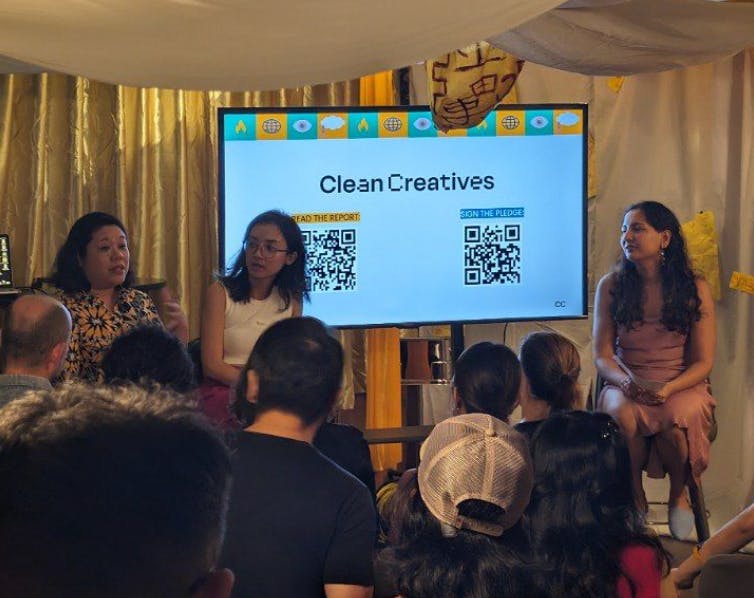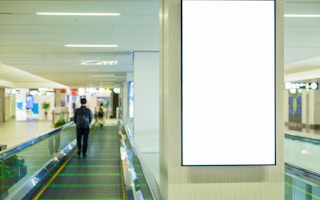Advertising briefs that contain unsubstantiated environmental claims are still common in Asia, where marketing agencies are keen to jump on the sustainability bandwagon but lack critical subject matter expertise, say professionals familiar with the inner workings of the industry.
To continue reading, subscribe to Eco‑Business.
There's something for everyone. We offer a range of subscription plans.
- Access our stories and receive our Insights Weekly newsletter with the free EB Member plan.
- Unlock unlimited access to our content and archive with EB Circle.
- Publish your content with EB Premium.
There is an increasing need for capacity-building for ad and public relations professionals in the region to reduce greenwashing risk and misinformation, they suggested. Companies also risk reputational damage if they hire communications agencies with little to no understanding of sustainability issues.
Communications professionals were speaking at an event hosted by Clean Creatives in Singapore last Thursday. The United States-based non-profit recently released a study that highlights for the first time the agencies working for fossil fuels brands in Asia.
Carolina Rodriguez, a former United Nations executive who runs sustainable development-focused creative agency Dilicidar, said that entering the advertising world has been “an insane experience” for her, because of how uninformed the business is on sustainability issues.

Meilin Wong (left), CEO of Milk & Honey PR, Qiyun Woo (centre), founder of The Weird and Wild, and Nayantara Dutta, research director for Clean Creatives. Image: EB Impact
“It was like suddenly being sucked into a parallel universe where nothing made sense,” she said. “Everybody’s super excited about sustainability. Everybody wants to jump on the bandwagon. But nobody – not clients nor their agencies – really understands it fully.”
She added: “It’s like teen sex. Everybody wants to be perceived like they are getting it. But nobody knows if they are doing it right – and there’s no adult supervision whatsoever.”
“
Agencies don’t do sufficient due diligence to verify claims provided by the client.
Meilin Wong, partner and CEO, Milk & Honey PR
False claims
Qiyun Woo, a Singapore-based creative communicator behind environmental education platform The Weird and Wild and a consultant for carbon measurement firm Unravel Carbon, said she has received briefs from agencies that contain false environmental claims.
“I have had to say [to the agency], ‘I can’t say this, because it’s not true, and it affects my credibility as a sustainability communicator,’” said Woo, adding that she has received briefs from agencies that have erroneously claimed that their clients have net-zero targets.
She said she has challenged agencies to provide third-party verified evidence to back up sustainability claims that she had been briefed to make through her work, and when told that this evidence does not exist, the agency was willing to remove the claim from the communication.
“If no one had told them that, it would have been on the script that came out of the creators’ mouth. I thought that was very dangerous – there was no due diligence,” she said.
Woo suggested there was a need to raise the level of sustainability expertise within agencies.
There is now growing concern that agencies and brand owners are misrepresenting or falsifying sustainability claims, and that sustainability awareness is generally low in the industry. Earlier this month, the trade association for the PR sector released guidelines for how image-management firms in Asia can avoid greenwashing.
Woo said she doesn’t blame communications professionals for having misconceptions around sustainability information, because she sometimes finds it difficult to navigate the technical terms and jargon.
There is a need for regulations in Singapore to ensure that brands are communicating sustainability responsibly – just as there are regulations for health advertising, she said.
Singapore’s central bank and regulator has mooted restrictions on sustainability communications in the finance sector to stamp out greenwashing, although formal regulations have yet to materialise. No such regulations have been proposed for sustainability communications in the broader consumer sphere.
Due diligence “skipped”
Meilin Wong, partner and chief executive of Milk & Honey PR, one of the few agencies in Asia to have made the Clean Creatives pledge to stop working for fossil fuels brands, said that creative agencies often take a client’s brief “at face value” and do not do the necessary due diligence to verify claims.
Clients need to provide “proof points” for sustainability claims at the briefing stage, she said. If the client cannot provide this information, then the agency will need to get clarity from the client, she said.
She believes the due diligence process is sometimes “skipped” by agencies, because it is time-consuming.
“It is a long and costly process – and agencies don’t do this for the client for free,” she said, noting that the verification process will often involve the entire team working on the account.
Natalie Seisser, founder and creative director of Singapore-based design studio ANEWKIND, said that creative agencies are often “at the end of the [value] chain” when executing a brand’s messaging, and that can become a problem. It means they have little power to push back against their clients’ sustainability claims, she said.
Twenty-one advertising and PR agencies in Asia have made the Clean Creatives pledge to stop working for fossil fuels brands – a sector notorious for greenwashing. Bangkok-based PR shop Vero was the first Asian firm to take the pledge.
Around 2,000 creatives and 800 agencies have signed the pledge globally – up from 1,000 creatives and 300 agencies just a year ago.








